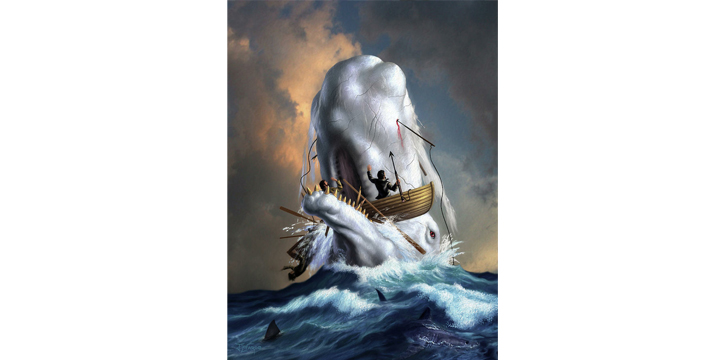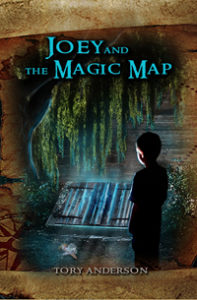I have a complicated history with Moby Dick. Of course, I had heard about the book long before I ever read it. Still, I didn’t actually read Moby Dick until it was assigned in an American Literature class in college. It was bound to be a failure. It is such a difficult book and I was only given only two weeks to read it, digest it, and write a paper on it. I didn’t understand a word. It was a horrible experience and I hated the book. Some ten years later I read it again, this time without any time constraints. It wasn’t so bad that time around. There were pieces of it I actually enjoyed. Seven years later I read it a third time. It started to grow on me as I sensed why it was a considered a masterpiece. Now, fifteen years later, I just finished it for the fourth time. Finally, I was ready for it. What a magnificent reading experience. It is a difficult book to be certain. Melville asks much of readers, but the readers who are ready for Moby Dick are in for rich read that comes to them on many different layers.
Believe it or not Moby Dick has moments of pure comedy. This may seem strange at first for a book with such a serious reputation. I don’t think I noticed the humor on my first three readings of the book. Now, after my fourth reading, I can’t understand how I missed it. The first big moment of humor is near the beginning of the book. The humor is situational. Ishmael, desperate for a room on a freezing cold night in Nantucket reluctantly accepts a bed with cannibal. The humor begins when the cannibal Queequeg, not knowing Ishmael is in his room and watching from under the covers, comes home late and prepares for bed. As Ishmael tells the story, “The next moment the light was extinguished, and this wild cannibal, tomahawk between his teeth, sprang into bed with me. I sang out . . .” The tattooed Queequeg, equally alarmed calls out, “Who-e debel you? ‘you no speak-e, dam-me, I kill-e.” The scene continues until the innkeeper runs in and restores the peace. Queequeg and Ishmael soon become good friends. The scene, though written 170 years ago, is similar to the sitcoms of today.
Not all Melville’s humor is so slapstick in nature. Much later in the book the humor takes on a rather figurative nature. A man slips and falls into the hanging head of a whale that has just been butchered. Buried in the cavity of the head he cannot extricate himself. To make matters worse the whale head then breaks free of the tackle and falls into the ocean where it immediately begins to sink. Queequeg heroically dives into the ocean and catches up with the sinking whale head. After feeling for the right place, he makes a cut. Pulling out the man’s leg he realizes the man is ‘breech.’ Like a midwife he works to turn the man and then delivers the man properly—headfirst—from what would have been his tomb. An obstetric metaphor isn’t something you expect in Moby Dick? Melville adds to the humor by noting, “Midwifery should be taught in the same course with fencing and boxing, riding and rowing.” In a book that is most commonly known for its megalomanic captain’s obsession with the “White Whale” Melville’s humor may be surprising, but it can be found throughout the book.
Another layer that strikes me is Melville’s ability to paint scenes with words that will haunt a good reader for years to come. The scenes I am thinking of are scenes that an average human may experience but then are lost due to the inability to express them. Take for example description when one whaling ship, returning from a four-year voyage, is passing the Pequod which is just beginning its journey:
As if the waves had been fullers, this craft was bleached like the skeleton of a stranded walrus. All down her sides, this spectral appearance was traced with long channels of
reddened rust, while all her spars and her rigging were like the thick branches of trees furred over with hoar frost. Only her lower sails were set. A wild sight it was to see
her long-bearded lookouts at those three mastheads. They seemed clad in the skins of beasts, so torn and bepatched the raiment that had survived nearly four years of cruising. Standing in iron hoops nailed to the mast, they swayed and swung over a fathomless sea; and though, when the ship slowly glided close under our stern, we six men in the air came so nigh to each other that we might almost have leaped from the mast-heads of one ship to those of the other; yet, those forlorn-looking fishermen, mildly eyeing us as they passed, said not one word to our own look-outs . . .
I remember this scene from my third reading of the book—the meeting eyes of the experienced lookout with the new lookouts as they pass silently on the sea. It’s a trivial moment that will be with me forever.
Then there is the picture of the Pequod looking like a burning creature escaped from Hell in the darkness of the night when its triworks are lit up in preparation to cook down the whale blubber into oil:
By midnight the works were in full operation. We were clear from the carcase; sail had been made; the wind was freshening; the wild ocean darkness was intense. But that darkness was licked up by the fierce flames, which at intervals forked forth from the sooty flues, and illuminated every lofty rope in the rigging . . . as the wind howled on, and the sea leaped, and the ship groaned and dived, and yet steadfastly shot her red hell further and further into the blackness of the sea and the night, and scornfully champed the white bone in her mouth, and viciously spat round her on all sides; then the rushing Pequod, freighted with savages, and laden with fire, and burning a corpse, and plunging into that blackness of darkness seemed the material counterpart of her monomaniac commander’s soul.
These vivid descriptions are the kinds of things I read for. They put me in places I’ll never be and create in me feelings I never would have during the course of my own life. Moby Dick is rich with them.
One last layer I will mention is the masterful manner in which Melville dives into intimate matters of the soul. He does this with main characters, and secondary and even tertiary characters. I will focus on Starbuck, the first mate. Starbuck’s soul is especially fascinating because it’s the only one that recognizes the dangerous insanity of the captain and feels impotent to do anything about it. During the perverse scene where Ahab seduces his crew into covenanting with him to hunt the White Whale at all costs, we see—and feel–the good and true Starbuck succumb to the power of Ahab’s will. Starbuck, the only sailor standing against Ahab’s obsession with Moby Dick, tells Ahab, “I came here to hunt whales, not my commander’s vengeance.” Starbuck is brave. He sees clearly, but he does not have the strength to withstand Ahab. Ahab says “Speak, but speak!—Aye, aye! thy silence, then, THAT voices thee. (ASIDE) Something shot from my dilated nostrils, he has inhaled it in his lungs. Starbuck now is mine; cannot oppose me now, without rebellion.” Starbuck realizes the seriousness of his failure and exclaims, “God keep me!—keep us all!”
Later in the book we find Starbuck with the captain’s gun in his hands gazing on the sleeping form of Ahab. His soul is wrenched as he, without premeditation, contemplates killing the captain in order to save the ship and crew from Ahab’s insane obsession. Starbuck struggles, “A touch, and Starbuck may survive to hug his wife and child again.—Oh Mary! Mary!—boy! boy! boy!” Does Starbuck win or lose with the following line, “The yet levelled musket shook like a drunkard’s arm against the panel; Starbuck seemed wrestling with an angel; but turning from the door, he placed the death-tube in its rack, and left the place.” To make me part of such a struggle of the soul is powerful writing indeed. Once more, near the last chapter, we feel Starbuck’s soul again. He is shaking hands with Ahab who is going out after Moby Dick for the third time in three days even though the first two attempts have ended disastrously. We see the purity of Starbuck’s soul, “Oh, my captain, my captain!—noble heart—go not—go not!—see, it’s a brave man that weeps; how great the agony of the persuasion then!” Ahab cries out, “Lower away!” and tosses Starbucks arm from him. Starbuck is only one example, but Melville plumbs the depths of many souls in this book with skill and humanity. Often I came away from a reading session feeling breathless, as if having just seen the secrets of my own soul.
Moby Dick is a magnificent book. It is almost a shame to give it the cliché of ‘masterpiece’ since the typical reader equates masterpieces with overrated books. These books appear overrated because works like Moby Dick demand so much of a reader. A reader has to prepare for this book the same way an athlete has to prepare to contend in a full Ironman competition. But how does a person prepare for a reading experience? For me education helped a little, but it was the life experience I had in-between readings that made all the difference. It takes patience to work through and appreciate the layers of meaning and experience found in Moby Dick. Patience is well rewarded with an unforgettable and perhaps even a life changing reading experience.
__________________________________________________________________________________
These books by Tory Anderson are now available on Amazon in Kindle and paperback format:





